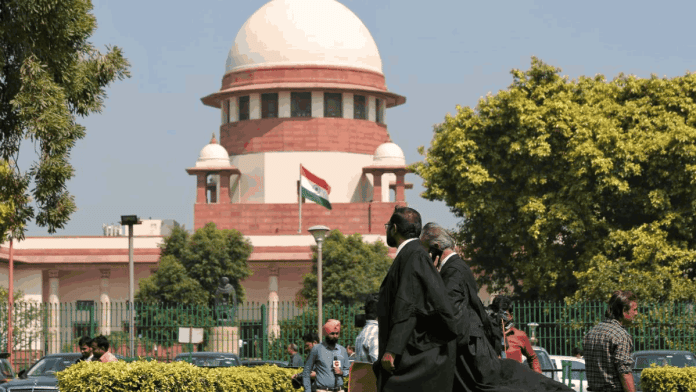New Delhi: Underlining that someone who has taken a loan for a commercial venture is not a “consumer” under the Consumer Protection Act, 1986, the Supreme Court has set aside an order passed by the National Consumer Disputes Redressal Commission (NCDRC), which had directed payment of compensation worth Rs 75 lakh by a bank to a branding company.
On 28 February, a two-judge bench of Justices Sudhanshu Dhulia and Prashant Kumar Mishra ruled that a borrower cannot be included in the definition of “consumer” under Section 2(1)(d)(ii) of Consumer Protection Act, if a loan was taken to generate profits.
The top court noted that in case of a company engaged in post-production of a film, which is a commercial venture, the dominant purpose is to attract more customers and generate profits for increasing revenue for the business.
Defining ‘consumer’
The 1986 Act defines the term “consumer” as any person who hires or avails any service for a consideration, which has been paid or promised, or partly paid and partly promised, and includes any beneficiary of such services, besides the person hiring or availing the services.
Importantly, it specifies that a consumer “does not include a person who obtains such goods for resale or for any commercial purpose”. It adds that someone who bought and used some goods exclusively to earn their livelihood through self-employment will not be considered to have acted with a commercial purpose.
In the present case, the court was acting on a plea filed by Central Bank of India challenging a 30 August order passed by the NCDRC, which is the body established by the government under the 1986 Act to deal with consumer complaints.
The 1986 statute allows an “aggrieved consumer” to seek redressal under the Act by way of filing a complaint in writing to the national or state commission, or even the district forum, to obtain relief.
Also Read: How SC invoked Article 21 to protect nursing mothers’ right to breastfeed in public spaces
The dispute & the NCDRC order
In the present case, the Supreme Court had to decide whether a loan borrower falls within the definition of a “consumer” under the provisions of Consumer Protection Act.
It was dealing with a challenge to an order passed by NCDRC, directing Central Bank of India to pay Rs 75 lakh to Ad Bureau, a branding and marketing company, due to a deficiency in service by the bank. It had also directed the bank to pay Rs 20,000 as litigation costs to the company, and issue a certificate saying that the loan had been settled by the company with no outstanding dues.
Nearly 11 years ago, a project loan of Rs 10 crore had been sanctioned by Central Bank of India to Ad Bureau, which was to commence the post-production of Rajnikanth-starrer film Kochadaiiyaan. After the company defaulted on the loan, it was classified as a non-performing asset in 2015, and this information was relayed to Credit Information Bureau of India Limited (CIBIL).
However, the two parties agreed to reach a one-time settlement, where the branding company agreed to pay Rs 3.56 crore to the bank, and the same was accepted by it. Even after this, there was no change or update in the company’s status as a defaulter.
This then led the company to file a case against the bank before the NCDRC, alleging that the bank had been grossly negligent and deficient in providing banking services, which consequently caused it monetary damages, loss of reputation, and even the cancellation of an exclusive advertising tender by the Airports Authority of India.
NCDRC noted that although both parties had reached a financial settlement, the bank had “wrongly reported” to CIBIL that the company was a defaulter and caused losses to the bank in the market.
Subsequently, both parties approached the top court against this 2023 order of the commission.
While the branding company thought the compensation awarded was inadequate, the bank argued that the NCDRC order was not sustainable in law as it was passed without taking into account whether the company is a consumer or not.
What SC decided
Relying on Section 2(1)(d)(ii) of the 1986 Act, the court noted that the provision makes it clear that where services are availed for any “commercial purpose”, then the person availing such service is not a “consumer”.
A company availing a project loan for post-production of a movie, with the dominant intention of generating profits, does not fall within the definition of “consumer”, the court said.
“A plain reading of the above makes it clear that where a service is availed, for any ‘commercial purpose’, then the person who has availed such a service is not a ‘consumer’,” the ruling said.
Taking into account the company’s argument that the loan was availed for a “self-branding exercise”, the court noted that the main or dominant purpose behind “brandbuilding itself is to attract more customers” and “generate profits”, or increase business revenue.
“A bald averment that company engaged itself in the post-production of the movie solely for the purposes of brand building does not alter the fundamental nature of the transaction, i.e. the availing of credit facility from the appellant bank, which was purely a business-to-business transaction, entered into for a commercial purpose,” the court said, adding that the post-production of a film involves multiple activities, which finally give shape and presentation to a film—a commercial venture.
(Edited by Mannat Chugh)
Also Read: Hearing Allahbadia’s plea, SC hands Centre delicate task: frame laws to curb ‘immoral’ content






